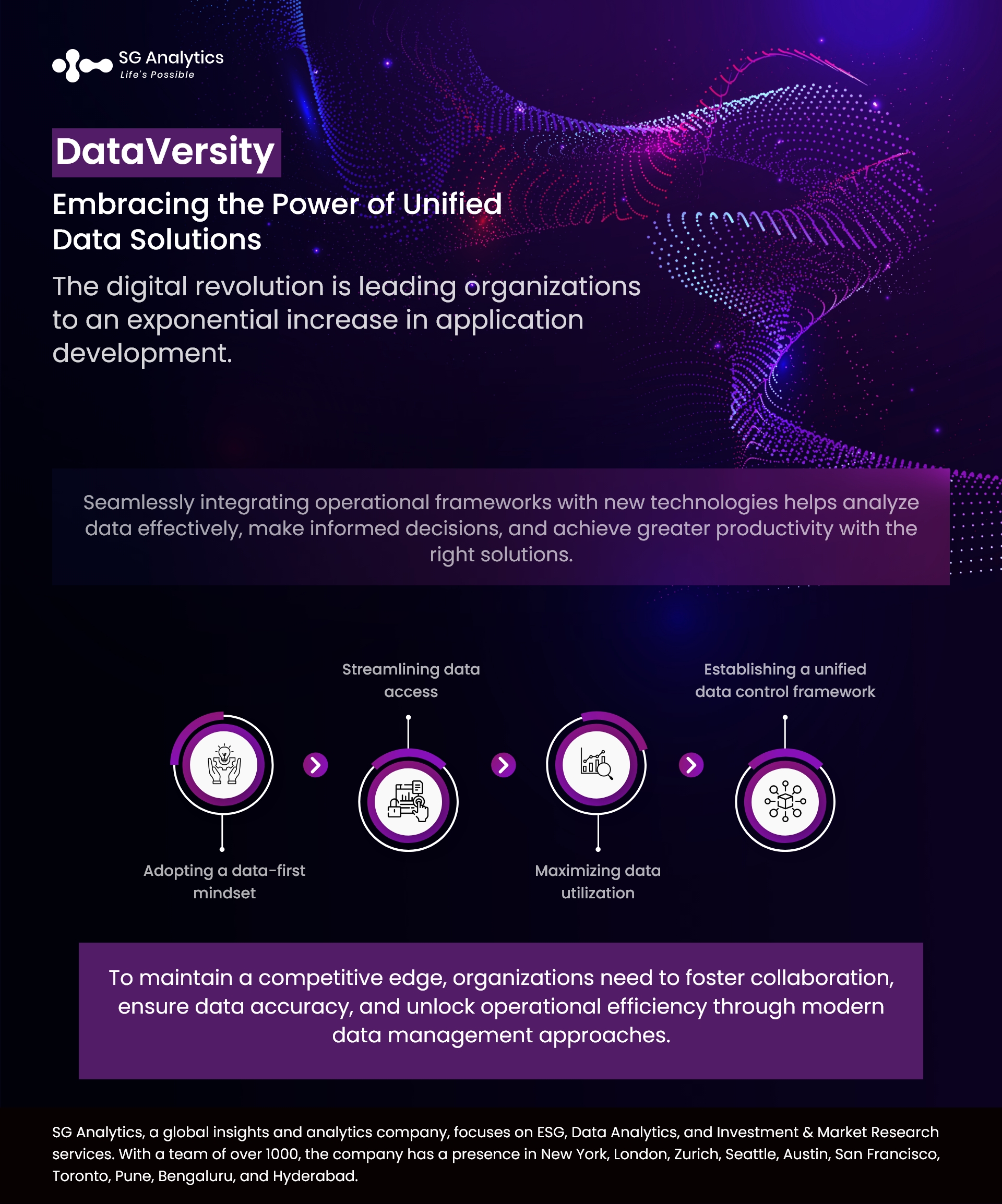The rapid success of generative AI technologies is emerging as an excellent example of how organizations shape their fortunes by harnessing the power of the data they hold. The insights from data are enabling enterprises across sectors to generate new revenue opportunities, enhance customer experiences, and drive process efficiencies.
For organizations today, data collection across the globe has skyrocketed, and this data explosion is creating new data control challenges for companies. Businesses are evolving the development of their applications and harnessing the power of analytics to manage the data.
Nearly 80% of organizations are adopting a multi-cloud strategy to carefully manage their data along with sensitive and personal data across different data systems and applications. There is also a growing need to scale enterprise-grade application development to leverage data and analytics for a minimally viable product while also addressing critical needs.
Read more: Harnessing the Power of Data to Transform Business Models and Drive Growth
To harness the power of data safely, organizations need to secure it from threats, govern data usage responsibly, and comply with varying regulatory requirements worldwide. To further fulfill these evolving data obligations, they must enable their respective data security, governance, privacy, and compliance with shared intelligence around sensitive data and automate tasks to collaborate and enforce data controls. Embracing a unified data control framework will further help organizations meet this objective, enabling them to unlock the value of their data.
The Demand for Scalable Data Application
The digital revolution is leading organizations to an exponential increase in application development. To meet this demand, organizations need robust and scalable solutions that will help accelerate application development while minimizing costs. Organizations are deploying data models in their database environments. These frameworks will empower organizations to turn ideas into reality and enable them to build custom applications that solve business challenges. These data models can be further integrated into other systems to record and store data.
Read more: Data Revolution: Empowering Businesses for a Data-driven Future

-
Adopting a Data-First Mindset
Traditional siloed approaches to data management are no longer effective today. Enterprises need to reassess their approaches and prioritize data at the forefront of their operations. Let's explore some ways organizations can strategically leverage their data:
- Foster a sense of collaboration: Adopting a data-first architecture helps get rid of data silos, enabling organizations to integrate different data solutions and cloud platforms into a single dataset. This further facilitates seamless collaboration across teams, thus fostering innovation and providing comprehensive insights for informed decision-making.
- Ensuring data accuracy: Inaccurate data complicates decision-making processes. By consolidating data into a single dataset, organizations can make informed decisions with real-time insights.
- Unlocking Operational Efficiency for Growth: Organizations equipped with a single source of data experience heightened efficiency, thus eliminating the need to sift through disparate data sources.
To respond to rapid market changes, drive operational efficiencies, foster collaboration, and maintain competitiveness, organizations are prioritizing a data-first approach.
-
Maximizing Data Utilization
The landscape of data management is evolving significantly. Today, data travels across diverse platforms, systems, and documents, posing challenges for enterprises striving to manage their data effectively. Consequently, decision-making processes often slow down.
Today, an organization's most critical obligation is to ensure that its data is accessible and usable by business teams. As a result, adopting a strong strategy will help manage complex but hyper-scale multi-cloud environments, which is an effective way to meet data obligations and become the standard for building a data-centric culture across companies.
Data is a strategic asset. By realizing this fact, organizations are becoming agile in today's changing market. They are also adopting a forward-thinking approach to data management to further minimize the margin for error.
Read more: Unlocking the Power of Unstructured Data with AI

-
Streamlining Data Access
Enterprises today understand the significance of a data-first architecture. With data emerging as a pivotal asset, enterprises are embracing multi-cloud data platforms to break free from the limitations of a single provider. Amidst this transition, they need to confront the challenge of selecting solutions that present a single dataset accessible across all cloud environments.
Multi-cloud approaches make it easier to derive insights and foster flexibility. However, these approaches present a sense of ease in leveraging data, and enterprises must ensure compliance with data regulations. Unified solutions further help meet these regulatory requirements while enhancing efficiency and scalability.
A data-first approach empowers organizations to derive actionable insights. Seamlessly integrating their operational frameworks with these technologies enables companies to analyze their data effectively, make informed decisions, and achieve greater productivity with the right solutions.
-
Establishing a Unified Data Control Framework
There are several components to implementing a successful unified data control architecture. Organizations can protect their data if they can locate their data assets. The classification of data is critically important. As part of the classification stage, data needs to be enriched with metadata insights that security, privacy, and governance teams need.
Mapping data processes and reviewing lineage will help understand how data can be used across the enterprise. Investing ahead to build this foundational intelligence can help streamline different company data security and privacy controls. From a security standpoint, organizations need to prioritize the remediation of security risks and unauthorized data access based on data sensitivity insights. Organizations need to mask sensitive data elements to ensure least-privileged access and compliance, making it easier to manage data breaches and automate breach response steps.
Read more: Data-Driven Decision-Making: The Key to Thriving in the Digital Age

Final Thoughts
In today’s rapidly growing business landscape, storing and accessing data is no longer an afterthought. Organizations need to transcend short-term objectives and embrace forward-thinking by incorporating a data-first mindset to unlock the full potential of their data assets.
Data is the backbone of any organization, which makes having a data-first architecture a critical component for success. By embracing a data-first approach, they will be better equipped to navigate the dynamic market complexities more effectively while also driving innovation and sustained success. Timely, informed decision-making further offers access to accurate and accessible data. To maintain a competitive edge in today's age of data-driven decision-making, organizations need to foster collaboration, ensure data accuracy, and unlock operational efficiency through modern data management approaches.
A leading enterprise in Data Solutions, SG Analytics focuses on integrating a data-driven decision framework and offers in-depth domain knowledge of the underlying data with expertise in technology, data analytics, and automation. Contact us today to make critical data-driven decisions, prompting accelerated business expansion and breakthrough performance.
About SG Analytics
SG Analytics (SGA) is an industry-leading global data solutions firm providing data-centric research and contextual analytics services to its clients, including Fortune 500 companies, across BFSI, Technology, Media & Entertainment, and Healthcare sectors. Established in 2007, SG Analytics is a Great Place to Work® (GPTW) certified company with a team of over 1200 employees and a presence across the U.S.A., the UK, Switzerland, Poland, and India.
Apart from being recognized by reputed firms such as Gartner, Everest Group, and ISG, SGA has been featured in the elite Deloitte Technology Fast 50 India 2023 and APAC 2024 High Growth Companies by the Financial Times & Statista.









